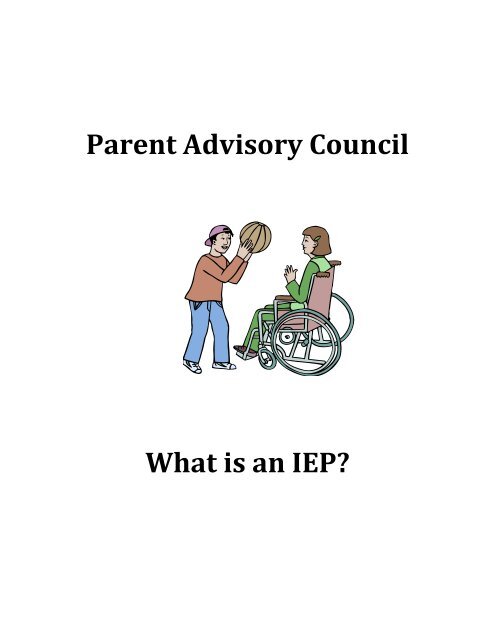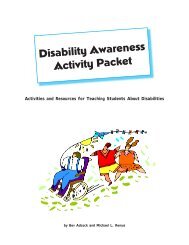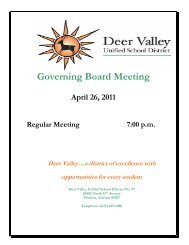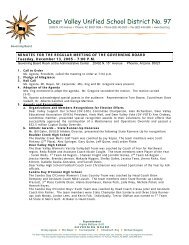What is an IEP? - Deer Valley Unified School District
What is an IEP? - Deer Valley Unified School District
What is an IEP? - Deer Valley Unified School District
Create successful ePaper yourself
Turn your PDF publications into a flip-book with our unique Google optimized e-Paper software.
Parent Adv<strong>is</strong>ory Council<br />
<strong>What</strong> <strong>is</strong> <strong>an</strong> <strong>IEP</strong>?
The Parent Adv<strong>is</strong>ory Council was establ<strong>is</strong>hed during school year 2007-2008 to adv<strong>is</strong>e the <strong>Deer</strong><br />
<strong>Valley</strong> <strong>Unified</strong> <strong>School</strong> D<strong>is</strong>trict Student Support Services’ Parent Lia<strong>is</strong>on. The Council <strong>is</strong><br />
composed of parents with children with special needs <strong>an</strong>d are presently enrolled in DVUSD.<br />
The Council represents the geographic area served by DVUSD.<br />
Committee Members<br />
Mindy Biernot<br />
L<strong>is</strong>a Bricker<br />
Dawn Kurbat<br />
J<strong>an</strong>et Lewark<br />
Tracey Peters<br />
Shelly Sedwick<br />
Ginger Pottenger, Parent Lia<strong>is</strong>on<br />
A special th<strong>an</strong>k you to Council member Dawn Kurbat for her work on drafting the “<strong>What</strong> <strong>is</strong> <strong>an</strong><br />
<strong>IEP</strong>” <strong>an</strong>d to Kathy Wolter for putting the booklet together <strong>an</strong>d making it look good!<br />
Virginia McElyea, Superintendent<br />
Governing Board<br />
Tom Boone, President<br />
Ann Ordway, Vice-President<br />
Chr<strong>is</strong>ty Agosta<br />
Ron Bayer<br />
Bill Maas
<strong>What</strong> <strong>is</strong> <strong>an</strong> <strong>IEP</strong>?<br />
<strong>IEP</strong> st<strong>an</strong>ds for Individualized Education Program. It’s a legal document which <strong>is</strong> a written<br />
agreement between you <strong>an</strong>d the school. Th<strong>is</strong> <strong>an</strong>nually written pl<strong>an</strong> <strong>is</strong> a “map of your child’s<br />
education services”. The <strong>IEP</strong> defines the special education <strong>an</strong>d related services that your child<br />
with d<strong>is</strong>abilities will receive. The <strong>IEP</strong> ensures that your child’s unique needs will be met. Every<br />
child receiving special education must have <strong>an</strong> <strong>IEP</strong>.<br />
Who writes the <strong>IEP</strong>?<br />
The <strong>IEP</strong> <strong>is</strong> written by a Team. The Team works together, collaborates, <strong>an</strong>d decides by consensus<br />
not by vote. Everyone on the team has <strong>an</strong> equal voice.<br />
Who makes up the <strong>IEP</strong> Team?<br />
• Parents/Guardi<strong>an</strong>s<br />
Parents are equal partners in the <strong>IEP</strong> process <strong>an</strong>d critical<br />
members of the dec<strong>is</strong>ion-making team. Parents should be<br />
actively involved with developing, reviewing <strong>an</strong>d rev<strong>is</strong>ing<br />
the <strong>IEP</strong>. Parental input <strong>an</strong>d attend<strong>an</strong>ce at all meetings <strong>is</strong><br />
one of your rights!<br />
• Your child (when appropriate)<br />
• At least one general education teacher of your child<br />
• At least one special education teacher of your child<br />
• A school or d<strong>is</strong>trict admin<strong>is</strong>trative representative (such as the school admin<strong>is</strong>trator or the<br />
Intervention Special<strong>is</strong>t)<br />
• Someone qualified to explain assessments <strong>an</strong>d evaluation reports (such as a psycholog<strong>is</strong>t<br />
or speech patholog<strong>is</strong>t)<br />
The school <strong>an</strong>d/or parents may request other individuals to attend the <strong>IEP</strong> meeting. For inst<strong>an</strong>ce,<br />
it may be helpful to invite someone who c<strong>an</strong> provide additional information, support, or expert<strong>is</strong>e<br />
about your child such as a neighbor, relative, friend, private therap<strong>is</strong>t or parent advocate. Please<br />
keep in mind that these guests may provide valuable input about your child.<br />
Remember<br />
Parents, you are your child’s best advocate! By learning to be a good advocate, you will help<br />
ensure that your child receives the appropriate education to which s/he <strong>is</strong> entitled under law.
<strong>What</strong> must the <strong>IEP</strong> include?<br />
• Description of your child’s abilities (strengths & needs) <strong>an</strong>d present level of perform<strong>an</strong>ce<br />
• L<strong>is</strong>t of goals for the year that are me<strong>an</strong>ingful, specific <strong>an</strong>d measurable.<br />
No goal should last forever. If progress <strong>is</strong> not being made, the <strong>IEP</strong><br />
team must meet to review the <strong>IEP</strong> <strong>an</strong>d, if needed, to rev<strong>is</strong>e it.<br />
• Description of related services that your child will receive such as<br />
speech, occupational therapy, physical therapy, ass<strong>is</strong>tive<br />
technology etc. Th<strong>is</strong> description should include how often, when<br />
<strong>an</strong>d where the services will be received<br />
• Description of how your child’s progress will be measured <strong>an</strong>d by whom. The data<br />
collected on progress will be reported back to parents at regular intervals<br />
• Description of how much time your child will spend in a general classroom, known as<br />
Inclusive Practices or<br />
• Inclusive Education. The goal <strong>is</strong> to keep your child in the Least Restrictive Environment<br />
which me<strong>an</strong>s that according to federal law, students with d<strong>is</strong>abilities must be educated<br />
with their non-d<strong>is</strong>abled peers to the maximum extent appropriate based on the students<br />
needs.<br />
• Details about necessary accommodations or modifications. Accommodations do not<br />
ch<strong>an</strong>ge curriculum. They only ch<strong>an</strong>ge the way your child <strong>is</strong> taught or allowed to respond<br />
or test (such as in the timing, formatting, setting, scheduling, response <strong>an</strong>d/or presentation<br />
of assignments). Modifications do ch<strong>an</strong>ge the type <strong>an</strong>d/or amount of curriculum taught<br />
<strong>an</strong>d are used when the student <strong>is</strong> expected to learn less or different content.<br />
Modifications c<strong>an</strong> include less content for struggling students. Modifications help<br />
customize assignments, tests, worksheets, <strong>an</strong>d other classroom materials.<br />
• Tr<strong>an</strong>sition Pl<strong>an</strong>ning after high school (begins at age 16)<br />
• Whether your child will receive ESY (Extended <strong>School</strong> Year)<br />
• IDEA does not include the Functional Behavioral Intervention Pl<strong>an</strong> (FBIP) as a required<br />
component of the <strong>IEP</strong>; it merely states that problem behaviors must be addressed by the<br />
<strong>IEP</strong> team.<br />
Key Points<br />
• The purpose of the <strong>IEP</strong> meeting <strong>is</strong> to focus on the child’s educational services <strong>an</strong>d work<br />
towards finalizing <strong>an</strong>d agreeing upon goals. Parents should receive a copy of both the<br />
<strong>IEP</strong> <strong>an</strong>d the meeting minutes<br />
• The <strong>IEP</strong> <strong>is</strong> reviewed at least once a year, or more often if needed, to see if rev<strong>is</strong>ions are<br />
needed<br />
• The child <strong>is</strong> re-evaluated at least every 3 years (Triennial), or<br />
• more often if needed, to determine if child still has a<br />
d<strong>is</strong>ability <strong>an</strong>d what are the educational needs<br />
• No ch<strong>an</strong>ges c<strong>an</strong> be made to the <strong>IEP</strong> unless parents have had<br />
the opportunity to participate in the dec<strong>is</strong>ion-making process
<strong>an</strong>d have received Prior Written Notice of the <strong>IEP</strong> team’s dec<strong>is</strong>ion. All ch<strong>an</strong>ges must be<br />
supported by current data<br />
• If concerns have not been fully addressed <strong>an</strong>d agreed upon, parents need to request that<br />
th<strong>is</strong> <strong>is</strong> documented in the meeting minutes with a pl<strong>an</strong> for follow-up resolution<br />
• By signing the <strong>IEP</strong>, it <strong>is</strong> only <strong>an</strong> indication you were present <strong>an</strong>d participated in the <strong>IEP</strong><br />
meeting<br />
Practical Tips<br />
Before <strong>IEP</strong> meeting parents should<br />
• Be proactive<br />
• Org<strong>an</strong>ize <strong>an</strong>d collect your own data<br />
• Communicate with other members of the Team ahead of time,<br />
including your own child<br />
• Review child’s current <strong>IEP</strong> (if applicable)<br />
• Make a l<strong>is</strong>t of child’s academic <strong>an</strong>d functional strengths <strong>an</strong>d<br />
needs<br />
• Consider what motivates your child <strong>an</strong>d what <strong>is</strong> your child’s learning style<br />
• Create a l<strong>is</strong>t of desired goals that you would like for your child to achieve<br />
• Submit all of your l<strong>is</strong>ts to the Service Coordinator at least 2 weeks prior to the <strong>IEP</strong><br />
meeting<br />
• Request that you receive a copy of the <strong>IEP</strong> “Rough Draft” prior to the actual <strong>IEP</strong> meeting<br />
so that you c<strong>an</strong> keep working on continued concerns or desired ch<strong>an</strong>ges. Remember, th<strong>is</strong><br />
<strong>is</strong> only a draft<br />
• Be prepared to work as <strong>an</strong> integral part of the Team in order to best meet the needs of<br />
your child<br />
• Be real<strong>is</strong>tic <strong>an</strong>d think “outside of the box”<br />
During <strong>IEP</strong> meeting parents should<br />
• Bring copy of <strong>IEP</strong> “rough draft”, along with questions <strong>an</strong>d concerns that you may still<br />
have<br />
• Ask for a copy of the <strong>IEP</strong> Meeting Agenda<br />
• While not <strong>an</strong> official part of the <strong>IEP</strong>, ask who <strong>is</strong> taking the minutes for the meeting so<br />
that you may obtain a copy before leaving<br />
• Take personal notes to include concerns, as well as positive feedback<br />
• Address these 5 areas:<br />
o Where are we now?<br />
o Where are we going?<br />
o How are we going to get there?<br />
o <strong>What</strong> does success look like?<br />
o How will progress be reported?<br />
• Ask for a copy of the finalized <strong>IEP</strong> <strong>an</strong>d meeting minutes
• Be assertive, not aggressive<br />
* stay calm, be proactive, <strong>an</strong>d focus on the needs of your child *<br />
After <strong>IEP</strong> meeting parents should<br />
• Periodically review <strong>IEP</strong> to compare it with class work <strong>an</strong>d child’s progress<br />
• Continue to communicate with other Team members<br />
• Frequently talk with your child about school <strong>an</strong>d encourage your child to learn selfadvocacy<br />
skills<br />
• You c<strong>an</strong> request a meeting at <strong>an</strong>y time if concerns ar<strong>is</strong>e<br />
• When things are going well, tell your Team members<br />
**Reminder – Be sure to fill out the Parent Involvement Survey**<br />
When should I request informal conference vs. formal <strong>IEP</strong> meeting?<br />
Not all concerns require a formal <strong>IEP</strong> meeting with the entire Team. First try to communicate<br />
<strong>an</strong>d resolve concerns by calling, emailing, writing the appropriate teachers, therap<strong>is</strong>ts, etc.<br />
Perhaps <strong>an</strong> informal conference with the appropriate people will remedy a concern.<br />
Some reasons to request a formal <strong>IEP</strong> meeting:<br />
• To d<strong>is</strong>cuss unresolved concerns <strong>an</strong>d CHANGES that need to be<br />
made in your child’s program/<strong>IEP</strong> such as: child has met a<br />
goal, child does not appear to be making progress, you feel<br />
additional services are needed or services are no longer<br />
needed, child has experienced a major ch<strong>an</strong>ge such as illness,<br />
surgery, injury, death of a family member.<br />
• To request that school re-evaluate your child<br />
<strong>What</strong> if there <strong>is</strong> a d<strong>is</strong>pute with the <strong>IEP</strong>?<br />
Practical D<strong>is</strong>pute Resolution<br />
• Attempt to address the <strong>is</strong>sue with teacher(s) first<br />
• Document concerns <strong>an</strong>d efforts you made to resolve problems<br />
Use the following road map after you have talked with your child’s teacher <strong>an</strong>d feel there are<br />
still unresolved problems:<br />
o Talk with your child’s service coordinator<br />
o Talk with your child’s <strong>IEP</strong> Team Intervention Special<strong>is</strong>t<br />
o Talk with your child’s school principal<br />
o Request <strong>an</strong> <strong>IEP</strong> review meeting<br />
o Work with your <strong>IEP</strong> Team<br />
• Request your school’s Student Support Services Facilitator come to a formal <strong>IEP</strong><br />
meeting<br />
• If after following the above road map there are still unresolved problems contact one of<br />
the Student Support Services M<strong>an</strong>agers or the Director of Student Support Services. See
DVUSD webpage:<br />
www.dvusd.org/pages_our_departments/educational_svcs_special_ed.htm<br />
Formal D<strong>is</strong>pute Resolution<br />
• Mediation – <strong>is</strong> the most informal d<strong>is</strong>pute resolution<br />
option. Mediation <strong>is</strong> a voluntary process that <strong>is</strong> held<br />
only if both parties (the parent <strong>an</strong>d the d<strong>is</strong>trict) agree<br />
to mediate. A mediator <strong>is</strong> provided by Arizona<br />
Department of Education/Exceptional Student<br />
Services (ADE/ESS) at no expense to either the<br />
parent or the d<strong>is</strong>trict.<br />
State Complaint – Admin<strong>is</strong>trative complaints must be in<br />
writing, signed <strong>an</strong>d filed with the ADE. Complaint investigators have authority to investigate<br />
alleged violations of state <strong>an</strong>d federal special education laws. Once a complaint containing all<br />
the required information <strong>is</strong> received by our ADE/ESS, <strong>an</strong> investigator <strong>is</strong> assigned to the case <strong>an</strong>d<br />
has 60 days to complete the investigation <strong>an</strong>d <strong>is</strong>sue a Letter of Findings.<br />
• Due Process Hearing – <strong>is</strong> the most formal of the d<strong>is</strong>pute resolution options, Parents,<br />
d<strong>is</strong>tricts or attorneys for either party submit a signed, written request for a special<br />
education due process hearing. ADE/ESS forwards th<strong>is</strong> request to the Arizona Office of<br />
Admin<strong>is</strong>trative Hearing where the case <strong>is</strong> assigned to the Admin<strong>is</strong>trative Law Judge, who<br />
will case m<strong>an</strong>age <strong>an</strong>d ultimately conduct the hearing.<br />
Please v<strong>is</strong>it the DVUSD website www.dvusd.org for additional resources <strong>an</strong>d preparation<br />
tools such as sample worksheets on how to write goals, formal request letters <strong>an</strong>d more!
<strong>Deer</strong> <strong>Valley</strong> <strong>Unified</strong> <strong>School</strong> D<strong>is</strong>trict<br />
20402 N 15 th Avenue<br />
Phoenix, AZ 85027<br />
623-445-5000<br />
Parent Lia<strong>is</strong>on<br />
623-445-4983





